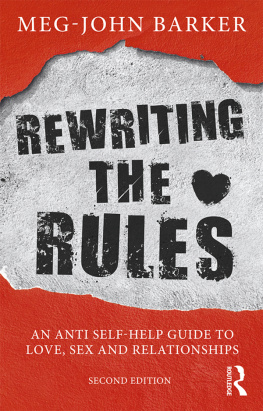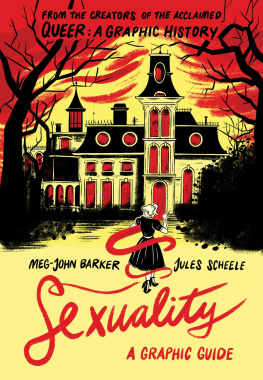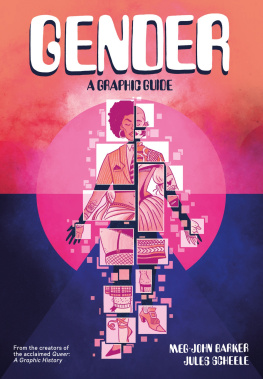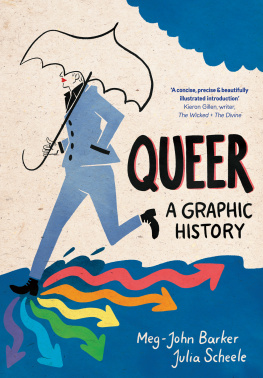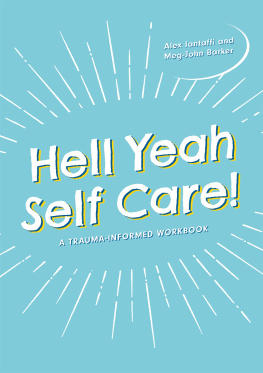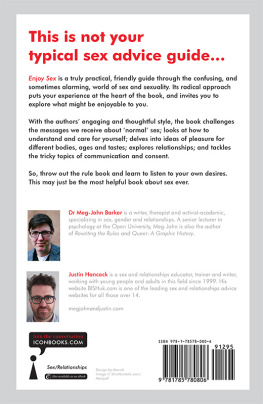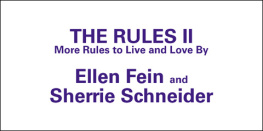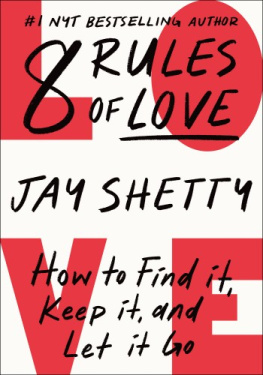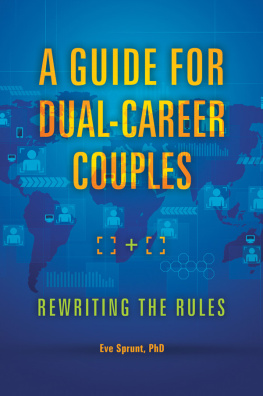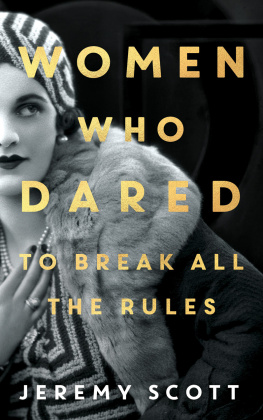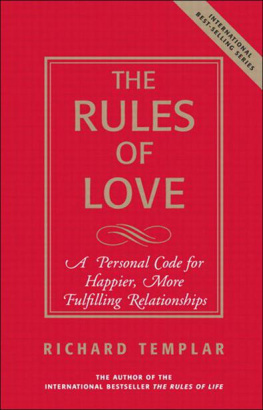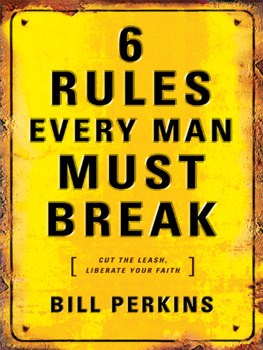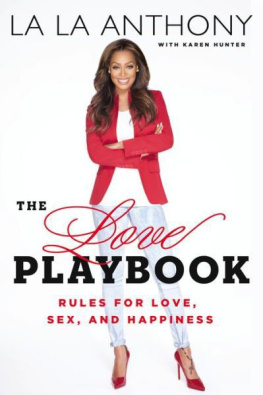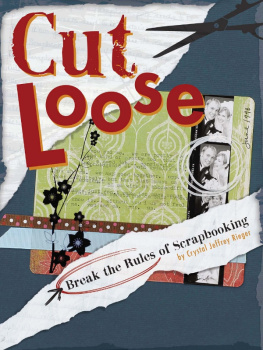First published 2018
by Routledge
2 Park Square, Milton Park, Abingdon, Oxon OX14 4RN
and by Routledge
711 Third Avenue, New York, NY 10017
Routledge is an imprint of the Taylor & Francis Group, an informa business
2018 Meg-John Barker
The right of Meg-John Barker to be identified as author of this work has been asserted by them in accordance with sections 77 and 78 of the Copyright, Designs and Patents Act 1988.
All rights reserved. No part of this book may be reprinted or reproduced or utilised in any form or by any electronic, mechanical, or other means, now known or hereafter invented, including photocopying and recording, or in any information storage or retrieval system, without permission in writing from the publishers.
Trademark notice: Product or corporate names may be trademarks or registered trademarks, and are used only for identification and explanation without intent to infringe.
British Library Cataloguing-in-Publication Data
A catalogue record for this book is available from the British Library
Library of Congress Cataloging-in-Publication Data
A catalog record for this book has been requested
ISBN: 978-1-138-04358-9 (hbk)
ISBN: 978-1-138-04359-6 (pbk)
ISBN: 978-1-315-17306-1 (ebk)
Typeset in Palatino
by Apex CoVantage, LLC

Welcome to the second edition of Rewriting the Rules . Before kicking off the book proper I want to say a few words about how its altered since the first edition, and what it means to me. If youre new to Rewriting the Rules feel free to skip onto and get cracking. If you want to hear about the changes Ive made, or about my personal relationship with this book, read on.
The first edition of Rewriting the Rules was published back in 2013. It was the culmination of the previous decade of my life. During that time I academically researched communities which were finding different ways of doing love, sex, and gender self-help style book bringing all that Id learnt together. I came up with the title Rewriting the Rules in 2003, and sketched out chapter headings and outlines over subsequent years. It was only in 2009 that I had enough courage to sit down and write the book. Even after that it took several years to find a publisher and get it out there (thanks Routledge).
Rewriting the Rules was a frightening book to publish. It was the first time Id stepped outside of my previous comfort zone of academic writing to write for the general public. Id always imagined this would be a better fit for me hopefully eventually my main job so there was a lot riding it.
More than that, several years previously I had a terrifying experience of my work being reported in the media in an uncontrollable way. I feared that something similar might happen again when I published Rewriting the Rules . In 2005 I gave a talk about the language of polyamory to a psychology conference (see ). As always in such talks, I was open about the fact that I was personally involved in those kinds of relationships as well as researching them. When the press at the conference spoke to me about my study and took my photo I imagined that a brief summary of the research would appear along with several others towards the end of the Monday editions of a couple of newspapers. Instead their reports about my work and personal life took up a significant portion of one of the first few pages of most of the national and some international papers, both on the Monday and the following weekend. If the Pope hadnt died that week I dread to think how bad it wouldve been! To give you a flavour, The Sun headline was Bisexual Boffin: Im a Slut; a columnist in one of the weekend broadsheets gave me a free psychoanalysis session despite never having met me; another accused me of taking all the fun out of infidelity and letting down my parents.
The experience of seeing yourself represented and misrepresented in the media is a terrifying and shaming one, particularly when its accompanied by journalists trying to track down your ex-partners, colleagues saying they dont know how to look you in the eye any more, and being told that you might lose your job because youve brought your institution into disrepute and that youll be scarred for life by what happened. The experience took a massive toll on my mental health, my confidence, and my relationships.
Hopefully that explains why publishing Rewriting the Rules felt like a big risk for me. Id learnt a lot from my previous experience, so this time I made sure my now very supportive university was aware of what was happening, I prepared friends and colleagues as much as I could, and did a whole bunch of self-care (see
I remember being so focused on publishing Rewriting the Rules that I had almost no conception of what my life would look like afterwards. I even harboured some hidden fears that I might not live long enough to see the book get out there. Fortunately I survived not only till then, but also till this point where Im putting out a second edition. Ive had the opportunity to author and co-author several further (anti) self-help books to develop the ideas in many of the chapters, and I hope to write many more in both written and comic book format in future. Ill point you towards these books and other resources at the end of the relevant chapters.
The concept of an anti self-help book that focuses on the problems with cultural messages, rather than with individuals, was pretty new back in 2013 perhaps explaining the reluctance of many publishers to take a chance on Rewriting the Rules . However, there now seems to be more of an appetite for this kind of thinking. For example, one of my favourite recent books on love What Love Is, And What It Isnt by Carrie Jenkins has a lot to say about wider cultural messages, and Carrie even describes her book as a self-help book for the culture rather than the individual (see ).
When I read back over the first edition of this book to prepare myself to work on the second edition I was struck by just how much Id been writing myself into being when I wrote Rewriting the Rules . Each chapter was a reflection on how I wanted to relate to myself and to others, even though I often wasnt anywhere near to getting there back then. Its heartening to realize that Im getting closer all the time, although its still never easy to step outside the various crab buckets (see ).
). I wanted to retain some of Meg Barkers voice even as I wove Meg-John Barkers ideas and style through it.
Perhaps the main reason for writing a second edition is that the world has also changed a lot in the areas the book covers, even in just five years. Weve had the legalization of same-sex marriage, the transgender tipping point, the proliferation of dating and hook-up apps for all relationship styles, and an explosion of terminology for diverse ways of doing and experiencing gender, love, and sex. Theres also been a major backlash against all this towards intolerance of difference, strict adherence to gender roles, and homophobic, biphobic, and transphobic laws and reporting. Those who transgress the conventional rules of love, sex, and gender have been labelled snowflakes and accused of political correctness gone mad or standing in the way of free speech. If anything, wider culture is even more individualizing of our problems than it was back in 2013, although theres also a much greater awareness of criticisms of neoliberalism and structural inequalities among young people, with teen mags, social media forums, vids, and podcasts often leading the way in these areas. I wanted to make sure that this second edition included all these things.

